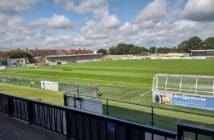Prost writer David Collins reflects on a unique, cultural experience as he joined 20,000 of his fellow Welshmen at the home of English football.
Wales is a passionate country. Few would contest that.
The Land of Song. An eclectic nation of tribes. The tough lads of Newport. The Young Farmers of Powys. The Swansea Jacks. Meibion Glyndwr.
All tribes historically resisting the Rape of the Fair Country. Together, Stronger, as the Football Association of Wales proudly claim.
This romantic image is not wholly untrue, though the practicalities call for a slightly more pragmatic view.
For example, the sheer geography of Wales does little to reinforce the notion of a single, unified, nation.
In the south, the M4 runs east to west, taking traffic from London and Bristol on a horizontal route through the perennial bottleneck which is Newport. In the North the A55 runs parallel to the only motorway in Wales. The M4 leads to England, not Llandudno.
North/South transport links in Wales are, frankly, embarrassing. It would take days to travel from Anglesey to the Rhondda Valleys via public transport.
Unsurprisingly then, certainly at club level, there is little crossover between the football worlds of North and South Wales. Cardiff and Swansea have their own neighbourly squabbles to keep them amused whilst Wrexham gloat in the demise of Chester City. Its East/West rather than North/South.
To many football fans in the south, the fortunes of Wrexham are a topic of moderate interest rather than fervent support. Most neutrals would, I guess, like to see Wrexham back in the Football League if asked to choose, though it’s not high on their list of things to worry about.
It was with some surprise then, that, as I boarded the 9.35 am train from Cardiff Central to London ready to cover Bromley v Wrexham in the FA Trophy Final at Wembley on a bright Sunday in May, I found the platforms decorated with many Wrexham shirts. I suppose that the national institutions and academic establishments which exist in the south, lure young hopefuls towards the capital. The accents on the train certainly bore more resemblance to Llangollen than Llanelli.
Despite observing the high standards of neutrality demanded of a sportswriter, I was therefore prepared to at least view proceedings from a Wrexham perspective, particularly as I would be tweeting live from Wembley in Welsh for @CymraegProst.
I squeezed into the Wrexham-dominated “Green Man” pub near the famous stadium for pre-match drinks, my fellow Welshmen apparently oblivious to my broken-bottle Cardiff accent. The Welsh Dragon pin badge on my chest was simply enough to reassure them that, today at least, I was one of them. A stranger amongst friends.
The 46,000 plus crowd underneath the arch was an impressive figure for a non-league fixture. The Welsh sang Mae Hen Wlad Fy Nhadau with customary vigour. Y Ddraig Goch held proudly aloft by the travelling Welshmen.
I took to social media to bring the events to Welsh speakers across the globe.
Wrexham lost the game. 1-0 through a second half goal from Michael Cheek. Chances for both teams and a late “equalizer” ruled out. It all felt very, Wrexham. The famous Welsh club have established a reputation for heartache and under-achievement over the many years, despite the high expectations of Hollywood owners.
To be honest, it almost didn’t matter. Bromley had dug themselves in well, refusing to be swept aside by the sea of Welsh hwyl. Wrexham have bigger dreams than the FA Trophy we hear.
The day had held many highlights though: our innovative, interactive, Welsh language coverage of a major UK football occasion had reached a new audience through digital comms and the power of social media. The cultural and equality implications of this cannot be overstated.
Sharing the stage with my northern colleagues had also been a wonderful thrill, as the magnificent traveling support did their boys proud. The noisy, emotional lads brought North Wales to North London; many bringing the Language of Heaven down with them.
Football can be a fickle mistress at times. She delights, she disappoints. She rejects.
On this sunny day at the home of English football though, football embraced equality, culture, hopes and dreams. Hymns and Arias. The Song of the Earth.
She provided a vehicle for an entire national culture, rich in language, colour and song. A display of pride, decorum and integrity. A metaphor for the best of life itself at times. So much more than just a game.
….and Prost were there, at every step of the day.
Follow us on Twitter @ProstInt
Non League
Wales
![Prost International [PINT]](https://prostinternational.com/wp-content/uploads/2021/08/PINTtFontLogoRoboto1536x78.jpg)


